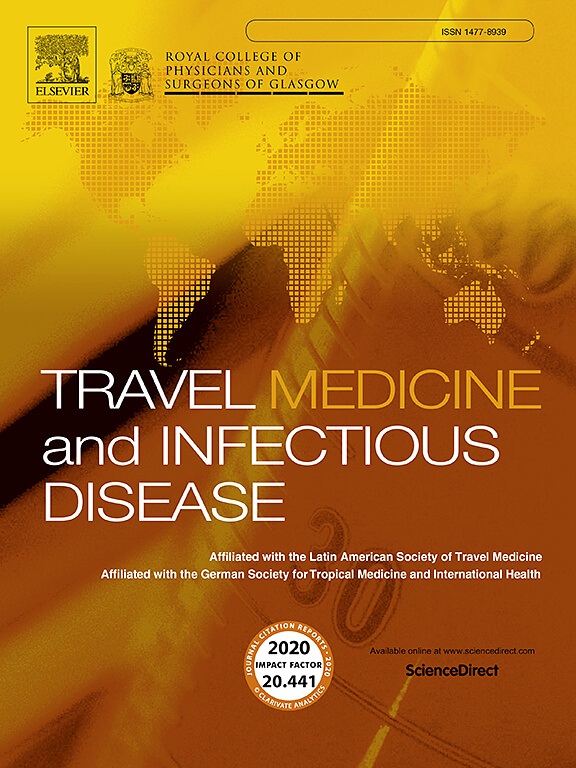Polish travellers on the move: A study of knowledge of travel health and associated practices among polish travellers abroad
IF 4.7
3区 医学
Q1 INFECTIOUS DISEASES
引用次数: 0
Abstract
Background
Post-pandemic travel has surged, with 1.3 billion journeys recorded worldwide in 2023, reflecting a growing interest in tropical destinations despite the associated health risks. Access to travel health information has improved, yet adherence to preventive measures remains limited due to misinformation, insufficient pre-travel consultations, and concerns about malaria prophylaxis. Based on data from a three-year survey, this study examines the attitudes of Polish travellers to vaccinations, malaria prophylaxis, and COVID-19-related measures.
Methods
Surveys conducted during travel festivals from 2021 to 2023 targeted adult participants. A questionnaire designed by experts in travel medicine addressed the demographics, travel behaviours, and health-related practices. Statistical analyses, including chi-squared tests and logistic regression, explored the impact of demographic factors on behaviours, using Python for data analysis.
Results
Among 644 participants (mean age 32; 48 % male), 49.5 % reported pre-travel vaccination and 281 intended to use malaria chemoprophylaxis. Gender significantly influenced vaccination status and travel to Africa. The most cited malaria prevention methods were repellents and mosquito nets. Illnesses were reported by 317 participants, with travellers' diarrhoea (185 cases) most common, particularly in Turkey, Egypt, and India. Forty-eight individuals required medical consultations.
Conclusions
Education and pre-travel counseling enhance adherence to preventive measures, yet many travellers fail to follow recommendations. Malaria remains the most common travel-imported disease in the EU/EEA, with 4856 cases in 2021. The Capability, Opportunity, and Motivation Behavior (COM-B) model highlights the importance of addressing these factors to improve compliance with preventive behaviours.
移动中的波兰旅行者:对国外波兰旅行者的旅行健康知识和相关做法的研究。
背景:大流行后的旅行激增,2023年全球旅行记录达到13亿次,反映出尽管存在相关的健康风险,但人们对热带目的地的兴趣日益浓厚。获得旅行卫生信息的机会有所改善,但由于信息错误、旅行前咨询不足以及对疟疾预防的关切,遵守预防措施的情况仍然有限。根据一项为期三年的调查数据,本研究调查了波兰旅行者对疫苗接种、疟疾预防和covid -19相关措施的态度。方法:在2021 - 2023年旅游节期间进行调查,对象为成人。旅行医学专家设计了一份调查问卷,涉及人口统计、旅行行为和与健康有关的做法。统计分析,包括卡方检验和逻辑回归,探讨了人口因素对行为的影响,使用Python进行数据分析。结果:644名参与者(平均年龄32岁;48%男性),49.5%报告旅行前接种疫苗,281人打算使用疟疾化学预防。性别显著影响疫苗接种状况和前往非洲的旅行。被引用最多的疟疾预防方法是驱蚊剂和蚊帐。317名参与者报告了疾病,其中最常见的是旅行者腹泻(185例),特别是在土耳其、埃及和印度。48人需要医疗咨询。结论:教育和旅行前咨询加强了对预防措施的遵守,但许多旅行者没有遵循建议。疟疾仍然是欧盟/欧洲经济区最常见的旅行输入性疾病,2021年有4 856例。能力、机会和动机行为(COM-B)模型强调了解决这些因素以提高对预防行为的遵从性的重要性。
本文章由计算机程序翻译,如有差异,请以英文原文为准。
求助全文
约1分钟内获得全文
求助全文
来源期刊

Travel Medicine and Infectious Disease
PUBLIC, ENVIRONMENTAL & OCCUPATIONAL HEALTH-INFECTIOUS DISEASES
CiteScore
19.40
自引率
1.70%
发文量
211
审稿时长
49 days
期刊介绍:
Travel Medicine and Infectious Disease
Publication Scope:
Publishes original papers, reviews, and consensus papers
Primary theme: infectious disease in the context of travel medicine
Focus Areas:
Epidemiology and surveillance of travel-related illness
Prevention and treatment of travel-associated infections
Malaria prevention and treatment
Travellers' diarrhoea
Infections associated with mass gatherings
Migration-related infections
Vaccines and vaccine-preventable disease
Global policy/regulations for disease prevention and control
Practical clinical issues for travel and tropical medicine practitioners
Coverage:
Addresses areas of controversy and debate in travel medicine
Aims to inform guidelines and policy pertinent to travel medicine and the prevention of infectious disease
Publication Features:
Offers a fast peer-review process
Provides early online publication of accepted manuscripts
Aims to publish cutting-edge papers
 求助内容:
求助内容: 应助结果提醒方式:
应助结果提醒方式:


